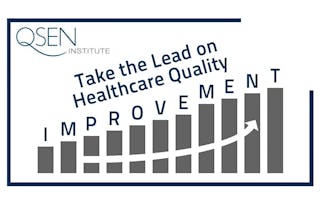In this course, you will learn about the importance of measuring the quality of care and health outcomes in order to determine whether Quality Improvement(QI ) initiatives have achieved their aims. You will learn about how data is utilised to identify areas of improvement and the importance of using both quantitative and qualitative data in evaluating change. You will learn about the specific methods appropriate for improvement as distinct from methods more suited to research, including how to design measurement schemes suitable for improvement initiatives

Ends soon: Gain next-level skills with Coursera Plus for $199 (regularly $399). Save now.

Using Data for Healthcare Improvement
This course is part of Quality Improvement in Healthcare Specialization

Instructor: Dr Thomas Woodcock
1,814 already enrolled
Included with
(45 reviews)
Recommended experience
Skills you'll gain
Details to know

Add to your LinkedIn profile
7 assignments
See how employees at top companies are mastering in-demand skills

Build your subject-matter expertise
- Learn new concepts from industry experts
- Gain a foundational understanding of a subject or tool
- Develop job-relevant skills with hands-on projects
- Earn a shareable career certificate

There are 4 modules in this course
In this module, you will learn about the importance of measuring quality of care and health outcomes in order to determine whether QI initiatives have achieved their aims. You will learn about how data is utilised to identify areas of improvement and the importance of using both quantitative and qualitative data in evaluating change. You will learn about the specific methods appropriate for improvement as distinct from methods more suited to research, including how to design measurement schemes suitable for improvement initiatives.
What's included
4 videos10 readings2 assignments1 plugin
In this module you will learn how to use the methods of statistical process control to distinguish between variation due to changes in the underlying process of care and variation that is part of this process, including how to distinguish when variation in a measure constitutes evidence of improvement in care. You will use the statistical software package R to analyse real time series data using Shewhart charts, and learn to interpret and act on the results. Example data is taken from a project screening for Atrial Fibrillation in an at risk population, and data on time spent in the accident and emergency department
What's included
1 video2 assignments5 ungraded labs
In this module you will build on what you learnt previously, expanding the repertoire of methods to cover additional types of data frequently encountered in quality improvement.
What's included
1 video1 reading1 assignment2 ungraded labs
In this module, you will learn about the use of qualitative research methods in QI in healthcare. This includes how qualitative methods can be used to drive improvement, and in studying and evaluating improvement. You will learn about the Matching Michigan study, including methods and key findings, as an example of the importance of theory in quality improvement. You will compare three theoretical frameworks for implementation and improvement, identifying their strengths and weaknesses, and use a tool designed to aid framework selection.
What's included
3 videos5 readings2 assignments2 discussion prompts
Earn a career certificate
Add this credential to your LinkedIn profile, resume, or CV. Share it on social media and in your performance review.
Instructor

Offered by
Explore more from Public Health
 Status: Preview
Status: PreviewThe University of Sydney
 Status: Preview
Status: PreviewCase Western Reserve University
 Status: Free Trial
Status: Free TrialImperial College London
 Status: Free Trial
Status: Free TrialUniversity of California, Davis
Why people choose Coursera for their career




Learner reviews
45 reviews
- 5 stars
88.88%
- 4 stars
4.44%
- 3 stars
4.44%
- 2 stars
0%
- 1 star
2.22%
Showing 3 of 45
Reviewed on Dec 27, 2023
I did not find the labs helpful. It was too distracting to find the content. I learned more from articles I pulled from the web.

Open new doors with Coursera Plus
Unlimited access to 10,000+ world-class courses, hands-on projects, and job-ready certificate programs - all included in your subscription
Advance your career with an online degree
Earn a degree from world-class universities - 100% online
Join over 3,400 global companies that choose Coursera for Business
Upskill your employees to excel in the digital economy
Frequently asked questions
To access the course materials, assignments and to earn a Certificate, you will need to purchase the Certificate experience when you enroll in a course. You can try a Free Trial instead, or apply for Financial Aid. The course may offer 'Full Course, No Certificate' instead. This option lets you see all course materials, submit required assessments, and get a final grade. This also means that you will not be able to purchase a Certificate experience.
When you enroll in the course, you get access to all of the courses in the Specialization, and you earn a certificate when you complete the work. Your electronic Certificate will be added to your Accomplishments page - from there, you can print your Certificate or add it to your LinkedIn profile.
Yes. In select learning programs, you can apply for financial aid or a scholarship if you can’t afford the enrollment fee. If fin aid or scholarship is available for your learning program selection, you’ll find a link to apply on the description page.
More questions
Financial aid available,

